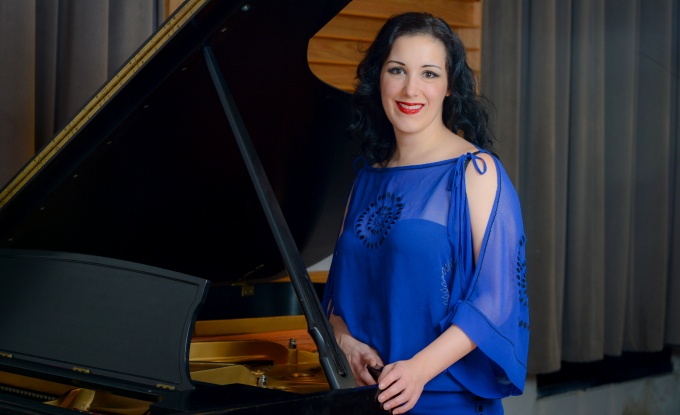(Case Scaglione)
Acclaimed conductor Case Scaglione is returning to UB on September 12 for the first concert of the Robert and Carol Morris Center for 21st Century Music’s fall season, which will consist of two essential pieces of 20th century repertoire: Aaron Copland’s Appalachian Spring and Luciano Berio’s Folk Songs. The works will be performed by the Slee Sinfonietta, featuring UB’s own soprano Tiffany DuMouchelle in Folk Songs. The concert will take place on Wednesday, September 12th, in the Lippes Concert Hall in Slee Hall on the University at Buffalo’s North Campus in Amherst. As usual, tickets are available at the Slee Hall box office, (716) 645-2921, and more detailed information is provided at the end of this post.
The Buffalo community has had the opportunity to see Maestro Scaglione
perform at UB twice before: first in 2013, when he conducted a concert with
music by Maurice Ravel, Edgard Varèse and Pierre Boulez, and more recently in
2016, when Dérive, by Boulez, was
followed by two pieces by Arnold Schoenberg: his Opus 4, Verklärte Nacht
(Transfigured Night), for string sextet, and Pierrot Lunaire (Op. 21), for voice and chamber ensemble.
Scaglione, who in the past has conducted prominent American and Asian
orchestras, such as the New York Philharmonic, the China Philharmonic
Orchestra, and the Hong Kong Philharmonic, spent much of the 2017-18 season in
front of the Oulu Symphony Orchestra, the Brussels Philharmonic, the Ulster
Orchestra and the RTE National Symphony Orchestra, among other European
institutions.
(Tiffany DuMouchelle)
Copland’s work, originally a ballet commissioned by Martha Graham, was
written between 1942 and 1944, and received the Pulitzer Prize the following
year. The composer later condensed the music, scored for a chamber ensemble of
thirteen instruments, to create a suite for orchestra at the behest of
conductor Artur Rodzinski. This orchestration retained all the essential
features of the music, omitting those sections in which the interest was
primarily choreographic. The Slee Sinfonietta will perform a version of the
condensed suite scored for the original ensemble of thirteen instruments.
(Aaron Copland)
Berio’s Folk Songs was
composed in 1964 on a commission by Mills College. Although the composer would
eventually write a version for full orchestra in 1973, the version to be
performed during the upcoming concert is the original for chamber ensemble. The
work was written for Cathy Berberian, an extremely versatile American soprano
with whom the composer had a prolonged professional and personal relationship.
They were, in fact, married for 14 years, and their collaboration resulted in
some of the most important vocal works of the second half of the 20th century,
such as Sequenza III, Recital I (for Cathy), Thema (Omaggio a Joyce), Circles and Epiphanie, in addition to the piece we are discussing.
(Luciano Berio)
The event is not to be missed, as it will surely offer exciting
performances of these admired works.
General Public: $15 plus $2 fee online at Ticketfly (up to 90 minutes prior to concert time) $15 plus $4 fee by phone at 877-987-6487 (Ticketfly) $19 in person at UB's Center for the Arts (Tue-Fri, 12pm-6pm) $22 in person at the door (one hour before concert time) Seniors/UB fac, staff, alumni/non-UB students: $10 plus $2 fee online at Ticketfly (up to 90 minutes prior to concert time) $10 plus $4 fee by phone at 877-987-6487 (Ticketfly) $14 in person at UB's Center for the Arts (Tue-Fri, 12pm-6pm) $17 in person at the door (one hour before concert time) All UB students with a valid ID will receive one complimentary ticket to all UB Music Department events.








No comments:
Post a Comment
Note: Only a member of this blog may post a comment.